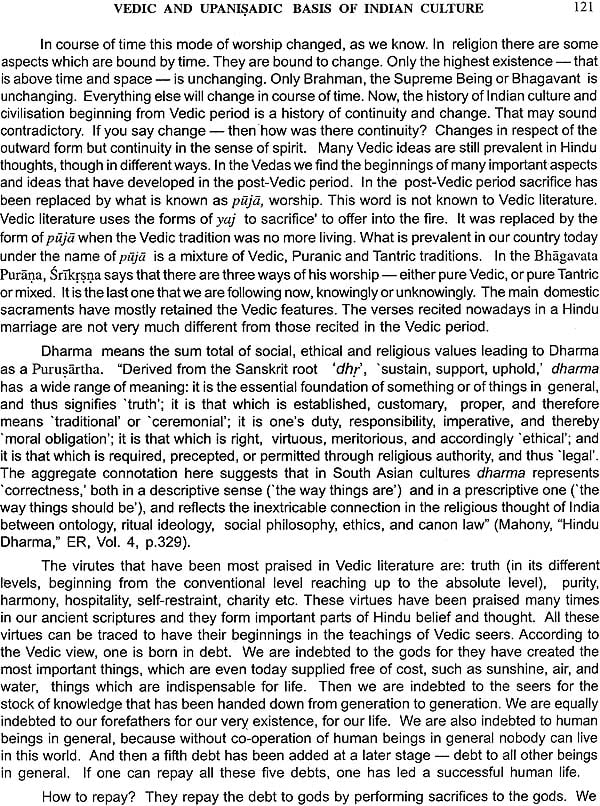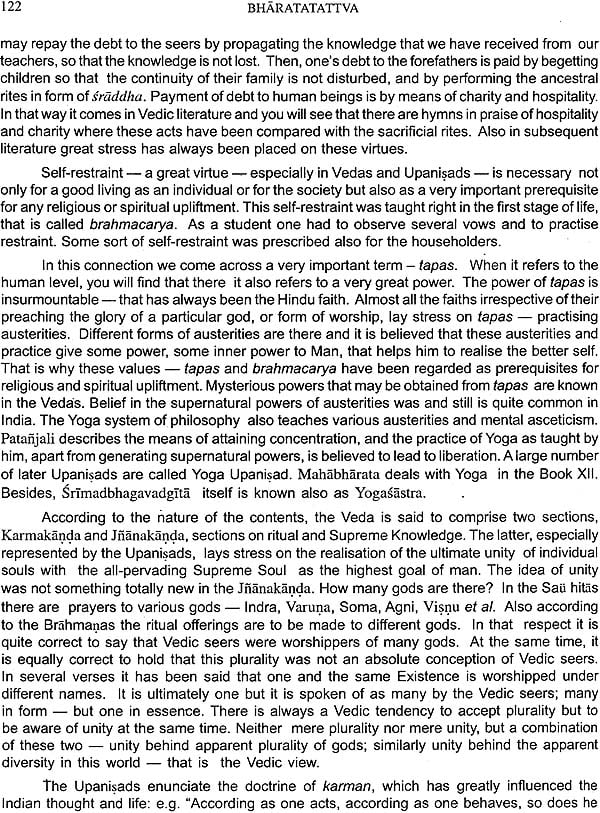
Bharatatattva (Course in Indology) A Study Guide: Volume 1)
Book Specification
| Item Code: | IDK667 |
| Publisher: | Ramakrishna Mission Institute of Culture |
| Language: | English |
| Edition: | 2009 |
| ISBN: | 8187332328 |
| Pages: | 204 |
| Cover: | Paperback |
| Other Details | 10.6" X 8.3" |
| Weight | 400 gm |
Book Description
Publisher's Note
There has been a growing interest in Indological studies in almost all Universities and Academic Centres in the East and West alike. The Centre for Indological Studies and Research of the Institute is also gaining importance in studies and research work in Bharatatattva (Indology). In order to maintain, foster and promote the studies of Indology, the Centre provides guidance to a number of Indian and foreign scholars.
The Centre has been conducting Bharatatattva course since the year 2000. The course content aims at giving the participants a deeper understanding of Indology with its spiritual, social, political and economic dimensions. The course has created interest among the public to know about the rich heritage of Indian culture, its different facets and also their relevance in today's context.
This Handbook containing the lectures delivered by the professors renowned in their respective fields in Bharatatattva will be much help to the participants of the course as a study guide and as a ready reference for those who have completed the course and also to those persons who are interested in Bharatatattva in general.
We are thankful to Professor Radharaman Chakrabarti and Professor Visvanath Chatterjee for their enormous endeavour to bring out the Handbook. We also extend our thanks to some of the students of Indology who have helped in publishing the volume. Our thanks also go to Sri Kaushik Kundu who has designed the cover page of the Handbook.
Introduction
Presented in this volume is the first part of a collection of papers based on lectures delivered during the first two academic sessions of the Course in Indology, introduced in 2000-2001. The course was intended to develop awareness of the rich cultural heritage of the country in its different facets and highlight its relevance in today's context. The course structure was so designed as to cover the entire panorama of the progress of Indian civilization. Vast as the subject is, the lectures offer the quintessence of the matter, with critical insights drawn from various sources-both primary and secondary, supplemented by research done at home and abroad.
The idea of bringing out the lectures in print is to ensure that those interested in learning the subject could do so with the aid of a formal yet simple study guide. There the discerning reader should be able not only to access the basics of the subject but have a glimpse of advanced thinking on several related issues.
In fact a proper study of Indology calls for a holistic as well as a comparative approach. The former assists a deeper understanding of the spirit of India in its multiple dimensions-social, political, cultural and of course, spiritual. The latter enables critical evaluation of one's heritage with due regard to its manifestation over the ages and across the regions. The focus ultimately is on the great cultural synthesis the India stands for.
Evidently, lectures delivered in classroom ambience, especially in interactive mode, could not possibly be put in black and white unless we had total cooperation and support of the eminent scholars who have been on the faculty. They have taken great pains to check, modify and update the matters transcribed from audio-cassettes.
Swami Prabhanandaji, Secretary of the Institute, entrusted to me the task of compiling and editing the volume. I would not claim the degree of perfection expected of such an enormous enterprise. However, in every sense it was a rewarding experience for me to go through the manuscripts and gaining for myself a comprehensive view of the various components of the Indology course. I took every care that editing is kept to the very minimum so that the discourses are put on record as originally presented. Even then for lapses, if there are any, the responsibility is mine, explained partly by the dearth of time in which the final reading had to be completed. As such, suggestions and advice for improvement from the faculty and the readers would be most welcome especially for the purpose of bringing out a companion volume in much better shape.
| 1 | The Wonder and Reality of Indian Culture | 9 |
| R.K. DasGupta | ||
| 2 | The Relevance of Indology | 20 |
| Radharaman Chakrabarti | ||
| 3 | The Importance of Indology Today | 31 |
| Nirod Baran Chakraborty | ||
| 4 | The Significance of Indology as a subject of Study | 36 |
| Radharaman Chakrabarti | ||
| 5 | The Concept of India | 45 |
| Bratindranath Mukherjee | ||
| 6 | The States in India | 56 |
| Bratindranath Mukherjee | ||
| 7 | The Pre-History and Proto-History of India | 76 |
| Ranjana Ray | ||
| 8 | Vedic and Upanisaidc Basic of Indian Culture | 108 |
| Samiran Chandra Chakrabarti | ||
| 9 | Early Indian Political Development | 139 |
| Pranabananda Jash | ||
| 10 | Early Indian Social History | 145 |
| N.N. Bhattacharyya | ||
| 11 | Proprietary Rights of Indian Women In Ancient India | 152 |
| N.N. Bhattacharyya | ||
| 12 | Developments In the Rural and Urban Economy of Early India | 159 |
| Ranabir Chakravarti | ||
| 13 | Early Indian Contacts with Countries Outside India | 167 |
| Ranabir Chakravarti | ||
| 14 | Early Indian Developments Rural & Urban Economy : Crafts And Commerce | 174 |
| Ranabir Chakravarti | ||
| 15 | Early Indian Education | 180 |
| Ranabir Chakravarti | ||
| 16 | Some Aspects of India Through the Western Lens | 186 |
| Visvanath Chatterjee | ||
| 17 | India Through the Lens of Literature: Tagore The Apostle | 191 |
| Subhas Sarker | ||
| 18 | India, As Reflected in Western Novels | 197 |
| Pradip Ranjan Sengupta |













